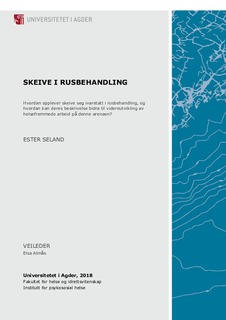| dc.contributor.author | Seland, Ester | |
| dc.date.accessioned | 2018-09-24T09:59:42Z | |
| dc.date.available | 2018-09-24T09:59:42Z | |
| dc.date.issued | 2018 | |
| dc.identifier.uri | http://hdl.handle.net/11250/2564055 | |
| dc.description | Masteroppgave psykisk helsearbeid ME504 - Universitetet i Agder 2018 | nb_NO |
| dc.description.abstract | Queer in drug treatment has been slightly described in research. In this master's thesis, I want to answer this; "How does the queer patient feel they are treated in drug treatment, and how can their description contribute to the further development of health-promoting work in this arena?" I have used a qualitative approach to analyse this issue. Originally, it was desirable to receive stories from informants that had been admitted to drug treatment during the last two years. This did not work. So I interviewed informants about the subject. I did not consider this selection as big enough to make a valid analysis of collected data, so I initiated a focus group interview with therapists working on drug treatment. Prior to this interview, I had a pilot group to reveal which topics might be relevant to illuminate. Data obtained from the informants (those who had been in drug treatment) and a categorization of these show that the informants had a great deal of themes such as shame, positive attitudes in the patient group, lack of belonging and lack of thematicization from their therapists. A further analysis of this led to the informants experiencing a weak identity, a desire to fit in and a sensation of being outsiders. The therapists thought it was a form of care for the queer patients that their sexual orientation were normalized in such a way that it was not mentioned in any context apart from given tasks where the patient himself took the initiative. This was a conscious strategy. Analysis of collected data shows high scores of belittering of the subject, positive attitudes and sexualized focus. This again was analysed to deal with fear of the unknown, lack of knowledge and good intentions. Literature and guidelines from the Norwegian Directorate of Health indicate that queers need special attention in drug treatment. Minority stress and homonormativity in society indicate that there are challenges related to this. One is a minority in society as drug addict, and one gets a dual minority experience by being a queer drug addict. This study shows that there are good intentions among therapists in drug treatment to take care of this patient group. But the knowledge to do this is too low. | nb_NO |
| dc.language.iso | nob | nb_NO |
| dc.publisher | Universitetet i Agder ; University of Agder | nb_NO |
| dc.rights | Attribution-NonCommercial-NoDerivatives 4.0 Internasjonal | * |
| dc.rights.uri | http://creativecommons.org/licenses/by-nc-nd/4.0/deed.no | * |
| dc.subject | ME504 | nb_NO |
| dc.title | SKEIVE I RUSBEHANDLING : Hvordan opplever skeive seg ivaretatt i rusbehandling, og hvordan kan deres beskrivelse bidra til videreutvikling av helsefremmede arbeid på denne arenaen? | nb_NO |
| dc.type | Master thesis | nb_NO |
| dc.subject.nsi | VDP::Medisinske Fag: 700::Helsefag: 800 | nb_NO |
| dc.source.pagenumber | 89 s. | nb_NO |

